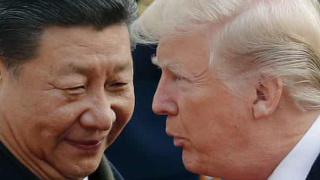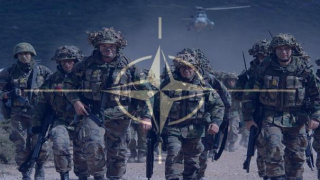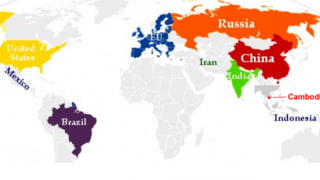The United States and Iran exchanged ultimatums on the nuclear deal
Washington put forward an ultimatum to Tehran, which he himself does not believe in the fulfillment of. In turn, the Spiritual Leader of Iran put forward his ultimatum to Europe on a nuclear deal.
We do not want to start a fight with these three countries, but, as history has repeatedly shown, Europe follows the United States. Therefore, EU countries should stop their silence, oppose US sanctions and prove that they are working on a nuclear agreement
- This is exactly how Ali Hosseini Khameneii expressed his demands to the FRG, France and Britain directly and almost with a threat. If we take into account that the word "must" was repeated in his speech more than once, some experts have already said that these demands can be called an ultimatum.
In order for Tehran to retain the agreement concluded in 2015 to halt its nuclear program, Europe must fulfill seven conditions. The participants of the nuclear deal from Europe should, as Al Jazeera puts it, "guarantee the continuation of trade cooperation with Iran, protect the sale of Iranian oil from US pressure," and not demand the abolition of the Iranian ballistic missile program and the change in Tehran's policy in the Middle East. Iran, in turn, will not discuss its missile program with other countries, because rocket tests are important for the national defense and protection of Iran's state interests and are not related to nuclear weapons, Ayatollah Khamenei said.
And he added threateningly:
In the event of the slightest delay with the response from European countries, Iran reserves the right to start its nuclear activities. If we find that the JCPOA is not profitable, one of the options will be the resumption of activities that were discontinued.
The JCPOA is the nuclear deal that was concluded in July 2015 in Vienna. There, Iran and the "six" international mediators - Russia, China, the United States, Britain, France and Germany agreed that Tehran will limit its nuclear program only for peaceful purposes, and the international community will remove sanctions from it. Incidentally, it was secretly assumed that the US would unfreeze Iran's financial holdings in its banks, which were seized after the Islamic revolution in Iran in 1978.
But the US decided that it was not necessary to respect the obligations
The agreement was not very pleasant to everyone - a sure sign of a just compromise. But after the election of US President Donald Trump, America took a course to exit the deal with Iran. And on May 8th, Trump officially announced that Washington had decided on this, and, therefore, renewed sanctions against Iran.
Apparently, America does not want to return money to Iran, or they have not had it for a long time - it was wasted.
And the other day Secretary of State Mike Pompeo, to somehow preserve the face of the United States, came up with "12 conditions" for Iran.
Washington is ready to sign a new bilateral agreement, he said, which will save Iran from sanctions, give him friendship with America, access to high technologies and so on.
But for this, the Iranians must fulfill the following 12 conditions:
First, Iran must declare to the IAEA a full account of the prior military dimensions of its nuclear program, and permanently and verifiably abandon such work in perpetuity.
Second, Iran must stop enrichment and never pursue plutonium reprocessing. This includes closing its heavy water reactor.
Third, Iran must also provide the IAEA with unqualified access to all sites throughout the entire country.
Iran must end its proliferation of ballistic missiles and halt further launching or development of nuclear-capable missile systems.
Iran must release all U.S. citizens, as well as citizens of our partners and allies, each of them detained on spurious charges.
Iran must end support to Middle East terrorist groups, including Lebanese Hizballah, Hamas, and the Palestinian Islamic Jihad.
Iran must respect the sovereignty of the Iraqi Government and permit the disarming, demobilization, and reintegration of Shia militias.
Iran must also end its military support for the Houthi militia and work towards a peaceful political settlement in Yemen.
Iran must withdraw all forces under Iranian command throughout the entirety of Syria.
Iran, too, must end support for the Taliban and other terrorists in Afghanistan and the region, and cease harboring senior al-Qaida leaders.
Iran, too, must end the IRG Qods Force’s support for terrorists and militant partners around the world.
And too, Iran must end its threatening behavior against its neighbors – many of whom are U.S. allies. This certainly includes its threats to destroy Israel, and its firing of missiles into Saudi Arabia and the United Arab Emirates. It also includes threats to international shipping and destructive – and destructive cyberattacks.
All in?
Some points sound reasonable - from the American point of view. Well, Americans do not believe that the Persians completely abandoned the previous plans for creating nuclear weapons. Strictly speaking, no one believes in this at all. But it's not a matter of faith.
It sounded like a real ultimatum. It is noteworthy that recently the US, in a boorish manner, reminded North Korea of a Libyan scenario. Then, too, was put forward an ultimatum. In North Korea, it was decided that it is better to be alive Kim Jong-un under sanctions, but with a nuclear bomb, rather than submissive, but dead Muammar Gaddafi. So could Michael Pompeo expect that Iran does not remember this story too?
In addition, the last paragraphs of the "conditions" resemble an outright blackmail, as if the decision to start hostilities has already been taken in Washington. Disarm and disband allies. To withdraw troops from the territory of the state, where they are under an agreement with the lawful authorities. Refuse the main principle of its foreign policy.
Iran, as we see, did not listen to America. And there are reasons for the Iranians to stay calm.
America will not achieve success in the war with Iran under any circumstances, military experts are convinced of this even in the States themselves. Great people, a powerful unifying ideology, a complex relief. You can destroy a lot, you can cause great damage to the troops and the civilian population. But to win in the style of conquest of Iraq - this will not work.
Sanctions? Tehran has been living in this regime for a long time. Technologies? So, except for the US, there are others who can share them. So, what did official Washington count on, putting forward such fantastic and frankly unrealizable conditions for Iran?
the answer of Europe
Meanwhile, Europe, silent after the ultimatum of Pompeo, quickly reacted to the words of Khamenei. German Chancellor Angela Merkel, who is on a visit to China, said that:
the agreement is not perfect, but other options are even more unstable, so Germany will still respect this agreement.
She announced the official position of Germany:
We are in solidarity with the Chinese side and believe that the existing agreement on Iran should continue.
Britain, as the most loyal dog of the United States, has not said anything yet, but French Foreign Minister Jean-Yves le Durant expressed sensationally, if not rudely: "We are completely against these decisions." It is an issue of extraterritorial measures: France remains a party to the nuclear agreement with Iran and "This agreement has not died."
totals
The US put forward an ultimatum akin to what is being done immediately before the war. But in the end, it turned out that this ultimatum did not frighten anyone! Neither Iran, nor Russia with China, nor even Europe.








